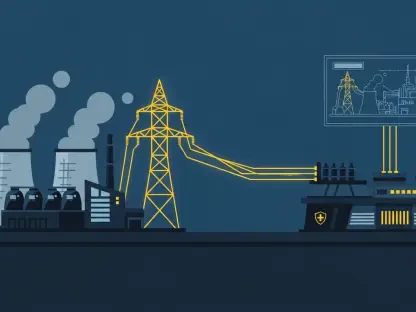The energy landscape in Europe is undergoing a profound transformation, driven by the urgent need to shift toward renewable sources and modernize aging infrastructure, and a recent transaction involving TenneT Germany stands as a striking example of this evolution that could reshape the future. Valued at up to 9.5 billion euros ($11.3 billion), the Dutch government’s sale of a 46% stake in TenneT Germany, the largest high-voltage power grid operator in the region, to a consortium of global investors marks a significant milestone. Announced on September 24, this deal not only reshapes the ownership structure of a critical energy asset but also highlights the growing reliance on private capital to fund the massive grid expansions required for a sustainable future. As funding demands escalate across the continent, this transaction offers a glimpse into how governments and private entities are navigating the complex interplay of financial strategy, national interests, and environmental imperatives.
Financial Dynamics of the Transaction
Unpacking the Deal Structure
The intricacies of the TenneT Germany stake sale reveal a carefully crafted financial strategy aimed at balancing risk and investment. The consortium, comprising Dutch pension fund manager APG, Singapore’s sovereign wealth fund GIC, and Norges Bank Investment Management (NBIM), which oversees the world’s largest sovereign wealth fund, has injected 8.5 billion euros through a private placement of new shares. This infusion ensures that TenneT Germany maintains its credit rating while providing a crucial financial buffer for the Dutch state. The ownership distribution within the consortium sees NBIM holding a 21.8% stake, APG with 11%, and GIC taking the remaining portion of the 46% stake. This structure not only diversifies the investment base but also underscores the appeal of stable, long-term returns in critical infrastructure, especially as Europe pushes for energy transition. The involvement of such prominent global players signals strong confidence in the sector’s future.
Investor Perspectives and Strategic Goals
Beyond the numbers, the motivations of the investors shed light on the broader implications of this deal for the energy market. APG’s CEO, Ronald Wuijster, emphasized the strategic importance of this investment, highlighting the reliable cash flow it promises for pension fund members. Additionally, the investment aligns with the urgent need for infrastructure upgrades to support Europe’s shift to renewables, a priority that resonates across the continent. Wuijster also noted Germany’s reputation as a dependable investment destination, further justifying the consortium’s commitment. The interest in securing a board position at TenneT Germany indicates a desire to actively shape the company’s direction, ensuring that financial and societal goals align. This perspective illustrates how private capital is not merely a funding source but a partner in addressing the monumental challenges of grid modernization, reflecting a trend where investors seek both profit and impact.
Broader Implications for Europe’s Energy Sector
Evolving National Interests and Collaborative Models
The sale of the TenneT Germany stake also brings into focus the evolving relationship between the Dutch and German governments, highlighting the complexities of national interests in cross-border energy infrastructure. Previous attempts to sell the unit directly to the German government fell through, revealing challenges in aligning strategic priorities. However, ongoing discussions suggest a potential shift toward collaboration, with both Dutch Finance Minister Eelco Heinen and representatives from Germany’s economy ministry confirming interest in a minority stake acquisition by Germany. Negotiations with KfW, a state-owned German lender, are underway, with clarity expected by the end of the current year. This development points to a hybrid ownership model where governments retain strategic influence without bearing the full financial burden, a pragmatic approach given Germany’s existing stakes in other grid operators like TransnetBW and 50Hertz.
Industry Trends and the Role of Private Capital
A wider lens on the energy sector reveals that the TenneT Germany transaction is part of a larger pattern of increasing private investment in Europe’s power grid infrastructure. The urgent need for capital to support renewable energy integration and grid expansion is evident across the industry, as seen in a similar deal involving Amprion, another German grid operator, which secured 3.2 billion euros from Apollo Global Management alongside RWE. Such transactions underscore how traditional owners, including governments, are turning to private investors to manage the staggering costs of modernization. Noted as one of the largest deals in Europe this year according to financial data, the TenneT sale exemplifies the critical role of financial markets in addressing infrastructure challenges. This trend suggests that public-private partnerships will likely become a cornerstone of energy policy, balancing economic realities with the pressing demands of climate goals.
Reflecting on Strategic Shifts
Lessons from a Landmark Deal
Looking back, the Dutch government’s divestiture of nearly half of TenneT Germany for $11.3 billion represented a pivotal moment in redefining the ownership landscape of essential energy assets. This transaction, supported by a powerhouse consortium of global investors, addressed immediate funding needs while setting a precedent for how private capital could bridge gaps left by public budgets. The deal’s structure, ensuring financial stability for TenneT Germany, demonstrated a thoughtful approach to mitigating risks for the Dutch state. Moreover, the potential for German involvement through a minority stake hinted at innovative ways to harmonize national interests with economic necessities. As Europe grappled with the dual imperatives of sustainability and financial prudence, this sale offered a blueprint for navigating the intricate balance of policy and investment, reshaping how critical infrastructure projects were approached in a rapidly changing energy landscape.
Future Pathways for Energy Financing
Reflecting on the aftermath, the TenneT Germany deal paved the way for actionable strategies that could shape the future of energy financing across the continent. Governments and industry stakeholders might consider accelerating the development of hybrid ownership models, where minority stakes allow strategic oversight without overwhelming financial commitments. Encouraging further collaboration with sovereign wealth funds and pension funds could unlock additional capital, leveraging their dual focus on returns and societal benefits. Additionally, policymakers could prioritize frameworks that attract private investment while safeguarding public interests, ensuring that grid expansions keep pace with renewable energy goals. As the energy transition continues to demand unprecedented resources, the lessons from this transaction underscored the importance of innovative partnerships, offering a roadmap for tackling the monumental challenges ahead with a blend of pragmatism and vision.









